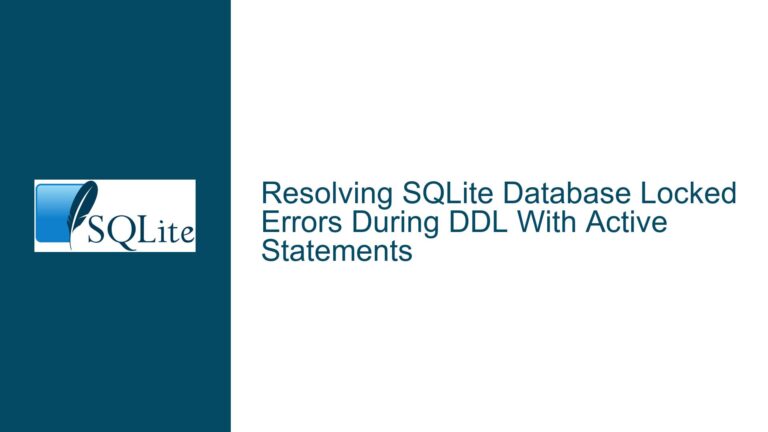Recovering from FOREIGN KEY Constraint Failures in SQLite
FOREIGN KEY Constraint Failure During sqlite3_step Execution
When executing a prepared statement using sqlite3_step, encountering a "FOREIGN KEY constraint failed" error indicates that the operation violated a foreign key constraint defined in the database schema. This typically occurs when an attempt is made to insert or update a record in a child table with a foreign key value that does not exist in the referenced parent table. For example, if you have a orders table with a foreign key referencing a customers table, and you attempt to insert an order with a customer_id that does not exist in the customers table, SQLite will raise this error.
The error itself is a safeguard to maintain referential integrity within the database. However, the challenge arises not just from the constraint violation but from the subsequent steps taken to recover and re-execute the prepared statement. In the provided scenario, the user attempts to recover from the error by calling sqlite3_clear_bindings and sqlite3_bind_int before sqlite3_reset, which leads to a "bad parameter or other API misuse" error. This sequence of operations is incorrect and highlights a misunderstanding of the SQLite C API’s state management.
The core issue revolves around the state of the prepared statement after a constraint violation. When sqlite3_step returns SQLITE_CONSTRAINT, the statement is left in a state that requires proper handling before it can be reused. Missteps in this recovery process can lead to further errors, such as the "bad parameter or other API misuse" error, which indicates that the API was called in an inappropriate state or with invalid parameters.
Incorrect API Call Order Leading to SQLITE_MISUSE
The primary cause of the "bad parameter or other API misuse" error is the incorrect order of API calls during the recovery process. Specifically, the user attempts to call sqlite3_clear_bindings and sqlite3_bind_int before calling sqlite3_reset. This sequence violates the expected lifecycle of a prepared statement in SQLite.
When sqlite3_step returns SQLITE_CONSTRAINT, the prepared statement is in a state where it cannot accept new bindings until it has been reset. The sqlite3_reset function is designed to return the statement to its initial state, allowing it to be re-executed. Attempting to bind new values before resetting the statement results in the "bad parameter or other API misuse" error because the statement is not in a state that accepts bindings.
Additionally, the sqlite3_clear_bindings function is unnecessary in this context. Clearing bindings is typically used when you want to remove all previously bound values from a statement, but it does not reset the statement’s state. The correct approach is to call sqlite3_reset immediately after encountering a constraint violation, which prepares the statement for re-execution and allows new bindings to be applied.
Another potential cause of the issue is the misuse of the sqlite3_bind_int function. If the parameters passed to this function are invalid, such as an out-of-range index or an incorrect statement handle, it can also result in the "bad parameter or other API misuse" error. However, in this case, the primary issue is the incorrect order of operations rather than invalid parameters.
Properly Resetting and Re-executing Prepared Statements After Constraint Violations
To recover from a FOREIGN KEY constraint failure and re-execute a prepared statement without encountering further errors, follow these steps:
Reset the Prepared Statement: Immediately after
sqlite3_stepreturnsSQLITE_CONSTRAINT, callsqlite3_resetto return the statement to its initial state. This ensures that the statement is ready to accept new bindings and be re-executed.Bind New Values: After resetting the statement, use
sqlite3_bind_int(or the appropriate binding function for your data type) to bind new values to the statement parameters. Ensure that the values you bind satisfy the foreign key constraint to avoid another constraint violation.Re-execute the Statement: Call
sqlite3_stepagain to execute the statement with the new bindings. If the new values satisfy the foreign key constraint, the statement should execute successfully.
Here is an example of the corrected code:
int update_filter_zip_result = sqlite3_step(data->update_filter_zip_stmt);
if (update_filter_zip_result == SQLITE_CONSTRAINT) {
printf("%s\n", sqlite3_errmsg(data->db));
// Reset the statement before re-binding and re-executing
if (sqlite3_reset(data->update_filter_zip_stmt) != SQLITE_OK) {
printf("Failed to reset update_filter_zip\n%s\n", sqlite3_errmsg(data->db));
return 1;
}
// Bind the new ZIP code value
if (sqlite3_bind_int(data->update_filter_zip_stmt, 1, entered_zip_num) != SQLITE_OK) {
printf("Failed to bind param for stmt to update filter ZIP code\n%s\n", sqlite3_errmsg(data->db));
return 1;
}
// Re-execute the statement
update_filter_zip_result = sqlite3_step(data->update_filter_zip_stmt);
if (update_filter_zip_result != SQLITE_DONE) {
printf("Failed to update filter ZIP code\n%s\n", sqlite3_errmsg(data->db));
return 1;
}
} else if (update_filter_zip_result != SQLITE_DONE) {
printf("Failed to update filter ZIP code\n%s\n", sqlite3_errmsg(data->db));
return 1;
}
In this corrected code, the statement is reset immediately after the constraint violation is detected. New values are then bound to the statement, and it is re-executed. This sequence ensures that the statement is in the correct state for re-execution and avoids the "bad parameter or other API misuse" error.
Additional Considerations
Error Handling: Always check the return values of SQLite API functions to handle errors appropriately. This includes checking the return value of
sqlite3_resetandsqlite3_bind_intto ensure that the statement is properly reset and new bindings are successfully applied.Foreign Key Validation: Before attempting to execute a statement that involves foreign key constraints, consider validating the foreign key values in your application logic. This can help prevent constraint violations and reduce the need for error recovery.
Transaction Management: If you are working within a transaction, ensure that the transaction is properly managed. A constraint violation may require you to roll back the transaction and retry the operation. Use
sqlite3_execwithBEGIN,COMMIT, andROLLBACKstatements to manage transactions effectively.
By following these steps and considerations, you can effectively recover from FOREIGN KEY constraint failures and ensure that your prepared statements are executed correctly. Proper understanding and use of the SQLite C API’s state management functions are key to avoiding common pitfalls and maintaining robust database operations.






